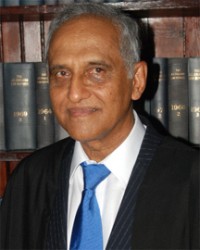With Sithe Global confirming its withdrawal from the Amaila Falls Hydroelectric Project (AFHP) over its failure to win full support from all the parliamentary parties, Private Sector spokesmen yesterday blamed partisan politics for setting the country back and warned of growing fear among investors.
In an advertisement ap-pearing in today’s Sunday Stabroek, the developer formally announced its withdrawal from the US$858.2 million, 165 megawatt AFHP, lamenting that all parties were not willing to set aside politics for the broader public good.
“The project was supported by the PPP, AFC and virtually all other non-partisan organisations that reviewed the project. However it was not supported unanimously by all three political parties, a necessary prerequisite to the project receiving international development funds re-quired to complete it. Thus, the project cannot move forward, despite 16 years of work and over US$16 million of independent Sithe Global expenditures and more than US$15 million of Govern-ment expenditures,” it said.
“We had hoped that the project’s 40-91 percent reduction in power prices for consumers, its significant environmental benefits and material positive impact on the economy via access to low cost, reliable power would have been sufficient for all political parties to support such a non-partisan project that would have served as a catalyst for growth for generations to come.
Unfortunately, not all parties were willing to set aside politics for the greater broader public good and, as a result, we today reluctantly announce our withdrawal from the project,” it added, while expressing its gratitude to the people for “full consideration” of the venture.
The company’s withdrawal, which was confirmed on Friday by government, came after the main opposition APNU voted against the Hydro Electric Power Amendment Bill 2013 and a motion to increase the ceiling of loan guarantees, which were passed by the government with the support of the AFC. President of Sithe Global Brian Kubeck had previously stated that the support of all three parties in parliament was crucial to its continued investment here.

Chairman of the Private Sector Commission (PSC) Ron Webster yesterday said that the news of Sithe’s exit came to him as a shock. “You cannot deal with these big companies in an ad hoc manner,” he said. “Why should they put their capital at risk when they could invest somewhere else and get better returns?”
Webster emphasised that Guyana needs low cost power, noting that the money Guyana spends on fuel could be used to fund the financing of the debt to make the project a reality. “We have messed up and have put ourselves back 20 years,” he said. “It is a real disappointment to see it come so far… let us hope that there is some room to change this,” he added.
President of the Georgetown Chamber of Commerce and Industry (GCCI) Clinton Urling said that the development represents the outcome of partisan politics. “What we are witnessing is the type of political environment that will scare aware investors and have disabling effects on our country’s economic fortune. Political uncertainty and gamesmanship will give investors reason to pause and question if Guyana is the place to put their investment dollars,” he said.
Urling added that in his many engagements with potential entities looking to invest, the uncertain political environment has been the most worrisome and he felt Sithe’s exit will only increase and reinforce the fear and reservation that many big investors now harbour about Guyana.
“The Chamber is disappointed with this outcome, especially since it comes a day after the Amaila Hydro Project was given the green light by a parliamentary majority. I wish to reiterate the call in our Competitive-ness Manifesto that our politicians need to work together in the interest of our country to ensure a stable political and economic environment,” he said.
Former PSC Chairman Gerry Gouveia also felt that there will be heavy fallout economically from Sithe’s actions.
“The effects of this will not only affect hydro investment itself but investment in the economy as a whole. It will shatter investor confidence. This was to have been one of the largest US investments in Guyana. What has happened here will make it difficult to attract investors. I think we are in for some tough times,” said Gouveia. “We are all shaken by this… Blackstone is not jokey people,” he stated.
“There are many people rejoicing because of this but they are not thinking about the loss of opportunities for our young people,” he said. He slammed what he referred to as armchair and Google experts for their negative portrayal of the project, scaring the investors away. “How could we create jobs without investors?” he asked.
‘Withdraw licence’

Meanwhile, accountant Christopher Ram, one of the many critics of the project, said that to seal the cancellation of the project, the licence issued firstly to Fip Motilall’s Synergy Holdings Inc. and later transferred to Sithe Global must be withdrawn forthwith.
He said that government must act with haste to ensure that the very licence is not transferred to another company. Further, Ram called Sithe’s statement to the nation an insult to the people of Guyana, inclusive of civil society, the labour unions, and Transparency Institute Guyana Inc., who he said all made substantial contributions to the debate.
“Sithe Global said that the project was comprehensively considered.
This is impossible…no comprehensive document was made available by Sithe, and even when drabs followed dribs of what was made available, it was hard enough reconciling the total project price and Sithe’s ‘all in’ charge,” he said. Ram said that the latter charge was first said to be US$100 million, then it moved to US$114.5 million and then to US$122 million.
“I am appalled and disgusted that Sithe Global would not only pretend not to know the difference between generation cost by AFHP and the tariff charged by GPL [the Guyana Power and Light Inc] to the consumer, but also they think we would not understand that,” Ram said.
“If this is the integrity that Sithe Global intends to bring to Guyana then they probably should not be here in the first place,” he said.
Ram also said he believed that President Donald Ramotar’s response on Friday night to Sithe’s walking away was very measured and responsible. “I am hoping that we do not abandon the project altogether,” he said. “Let us look at it from a technical, economic, financial, environmental and social perspective and then try to develop it using our own resources,” he said. According to the analyst, while he had no problem with the ratio of debt to equity, he found that the cost of the debt was too high for the country.
“I don’t see why we couldn’t get concessional rates for such a green development project,” he said. “This is a classic case of a [carbon offsetting, green energy project],” said the financial analyst.
He said that the World Bank and IDB should be approached for financing in this regard. The analyst agreed that Amaila so far seems the most workable site for a hydro facility at this time.
But, he said, Guyana should continue to explore opportunities with Brazil with respect to hydro facilities.
At the same time, he cautioned that care should be taken to consider issues of Guyana’s sovereignty in all of these arrangements. He said that transnational projects such as hydro schemes are not unusual.
Turning to the problems plaguing the Guyana Power and Light, the analyst said that Chairman of the GPL Board Winston Brassington should have been focusing more of his time on fixing the troubled corporation instead of leading the negotiating process for the Amaila project.
Noted government critic, former Guyana Electricity Corporation boss Ramon Gaskin in reacting to Sithe’s pull out said, “I am glad Sithe decided not to proceed with the project. It would have sent up tariffs by 23 percent.”
“The way is now open for the government to retender for the project. But not at US$840 million and not at those interest rates,” he said. “If we get a good deal then we can do it ourselves,” he said.
He called the rates agreed to for the project of 19 percent return for Sithe’s equity, and 9 and 8 percent for IDB and CDB criminal and highway robbery.




